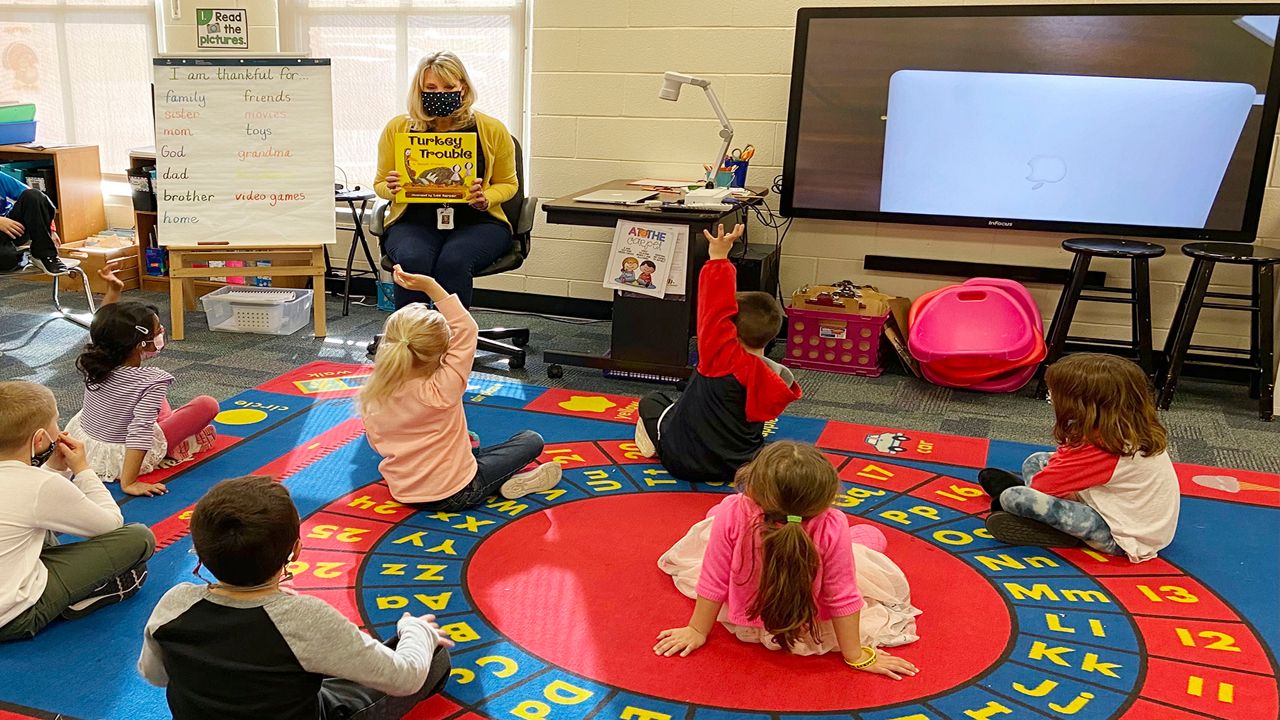ORLANDO, Fla. — Central Florida teachers unions and at least two state legislators reacted in unison Thursday to Gov. Ron DeSantis’s new budget proposal for education.
Don’t forget the experienced teachers, they said.
What You Need To Know
- DeSantis proposes $550 million for teacher raises in his 2021-2022 budget
- Like last year, he emphasizes raises for teachers who earn the least
- Some legislators, teachers unions urge more funding for experienced teachers
- RELATED:
DeSantis said Thursday he’s proposing $550 million, an increase of $50 million from this year, in the 2021-2022 state budget “to continue raising the minimum K-12 teacher salary to the goal of getting the average minimum salary statewide to be $47,500.”
The governor said the budget also would include salary increases for “other eligible teachers and instruction personnel.”
DeSantis said his proposed budget “builds off that success” of increasing teacher minimum salaries. But teacher advocates expressed concern that, like last year, his proposal largely might abandon the most experienced teachers.
“We think it is great that he is putting priority toward educators’ salaries,” said Vanessa Skipper, vice president of the Brevard Federation of Teachers. “But we hope that the money will be more balanced and that veteran teachers will see an increase to their pay as well.”
DeSantis’s education proposals include $12.9 billion in state funding for K-12 public schools. That amounts to $8,019 per student, $233 more per student than last year, DeSantis said.
As he works to get his $96.6 billion budget proposal passed, the Republican governor carries the advantage of a GOP-controlled Florida Legislature.
“We’re looking at a trifecta of conservative control in Florida,” state Rep. Anna Eskamani (D-Orlando) told Spectrum News 13.
Eskamani pointed out that Democrats would present their own budget proposal and that it would address teacher-pay compression, or little difference in pay amid large differences in experience.
“We need to ensure that our veteran teachers are treated with the same respect and dignity as anyone else,” she said. “And the fact of the matter is right now, we’re seeing teacher raises for new teachers. Meanwhile, their colleagues who have been there for years are not seeing the same type of boost, so it’s really something we have to address during the legislative session.”
State Sen. Linda Stewart (D-Orlando) noted Florida’s reported $2.7 billion shortfall next fiscal year and said she wants to avoid cuts to education funding.
“I’m saying that anything we can get is great,” Stewart told Spectrum News 13. “If they’re trying for incremental increases, I don’t know that we can do much better.”
She also said she’d “like to see more money put toward experienced teachers” and “would like to see if we couldn’t accomplish that.”
DeSantis in June hailed the approval of $500 million that Florida dedicated to increasing teacher salaries statewide — all but $100 million of it to raise the minimum base pay for full-time classroom teachers.
The legislation required school districts and charters to raise all full-time instructional classroom teacher salaries to at least $47,500 “or the maximum amount achievable based on the district’s allocation.”
In November, the Orange County Classroom Teachers Association and the Orange County School Board agreed to a 16% increase in the salaries of the district’s lowest-paid teachers.
The deal would the raise minimum teacher salary to $47,500 from $40,900 and give all teachers at least a 1.27% pay increase.
Classroom Teachers Association President Wendy Doromal said at the time in an OCPS news release that the association had “promised to leave no teacher behind and is excited we could reach an agreement to ensure that every certified teacher will be given a raise.”
The Classroom Teachers Association couldn’t be reached for comment on the DeSantis budget proposal on Thursday, but other education associations quickly expressed concern.
“This was done to divide the teachers, the one that he did this year,” Dan Smith, president of the Seminole Education Association, said of DeSantis. “Because there is division.”
Smith said all of last year’s Seminole County allocation went to teacher-based positions, leaving out guidance counselors, instructional coaches, bus drivers, food-service workers, and others.
Education associations emphasized Thursday that the governor also had announced efforts to recruit and retain teachers. They said schools would find it difficult to keep younger teachers after a few years when they saw big declines in their pay raises.
This year’s funding emphasis on the lowest salaries “caused a lot of hard feelings, strife, contention,” said Lare Allen, president of the Osceola Education Association. “It pitted new teachers (against) veteran teachers.”
He added: “Imagine that you’ve been on the job 10 years and there’s someone brand new, and you’re expected to train them, introduce them to your culture, how to get things done, what’s the best way to get things done, and get the best results with the least amount of stress put on them. But the state said, ‘You know what?’ We’re going to raise (younger teachers’) salaries so much, and you — good luck.’”
Allen and others also said the state government shouldn’t decide how school districts spend their funding allotments.
“What I would propose is that the state stays out of the local school boards’ business,” he said. “The school board and the union should be able to sit down and negotiate how that money best meets the needs of their particular district.”
As for next year’s budget, he said, “I’m not holding out hope that the Legislature does the right thing unless parents and community groups get involved. The school board is elected by those people. Let the people they elected make those decisions. It shouldn’t be coming from the state level.”



